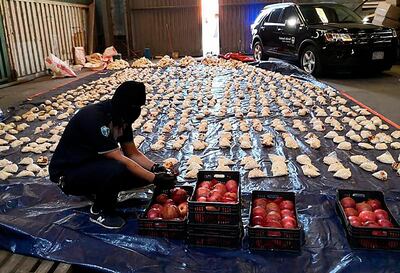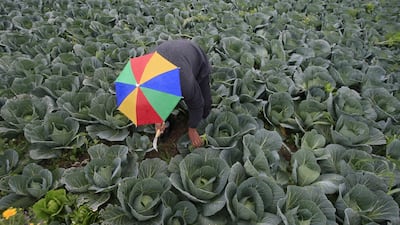Shoppers at Madina Al Riyadiye, a fruit and vegetable market in Beirut, were treated to a small bonanza this week, when they saw lemons, bananas and other fruits on offer at discounts of up to 50 per cent. In a country where food prices and poverty rates have risen dramatically since the start of an economic crisis more than a year ago, the fire sale was a rare respite. For Lebanon's farmers, it is a complete disaster.
The rush to offload fruit wasn't spurred by competitive market sellers or an unexpectedly successful crop yield, but rather by drug dealers and unscrupulous customs officials. Last week, after discovering millions of amphetamine pills in a shipment of pomegranates delivered from Lebanon, authorities in Saudi Arabia decided to halt Lebanese agricultural produce imports indefinitely, until security fears are allayed. The decision was supported by the majority of Saudi Arabia's Gulf neighbours, who receive the bulk of Lebanese agricultural imports via Saudi ports. Consequently, Lebanese fruit and vegetable farmers, who have seen their own costs rise as a result of the economic crisis, have found themselves cut off from the Gulf, which accounts for 55 per cent of their export trade.
Agriculture as a whole accounts for a mere five per cent of Lebanon’s economy, and the majority of exports are produced by large-scale commercial operators rather than independent farmers with fewer resources, who tend to produce for domestic consumers. But the latter will lose out from the dumping of products intended for export into local market stalls. And the longer the situation continues, the more it will threaten the jobs of ancillary workers, such as lorry drivers.

The impact will be felt outside of Lebanon, too. Saudi Arabia’s ban covers not only fruit and vegetables originating in Lebanon, but also those transiting there. Lebanese agriculture industry representatives have concluded that the pomegranate shipment disguising the amphetamines originated in Syria, highlighting the importance of Beirut as a trade hub for Syrian farmers. Even within Lebanon’s agriculture sector, Syrian refugees, some of whom remit money to their families back in Syria, comprise the majority of labourers.
Lebanon's economic crisis notwithstanding, it has already been a difficult year for farmers across the Middle East. Climate change, Covid-19, ongoing locust plagues and other market forces have already forced price increases in the food sector, putting food security at the top of the regional agenda. Most Arab countries rely on food imports from outside the region, and, as experts from the UN's Food and Agriculture Organisation have said, taking advantage of the "enormous untapped potential" for intra-regional trade would benefit everyone. A recent report from the World Bank noted that breaking down barriers in agricultural trade between Arab countries would be integral in the region's post-Covid-19 economic recovery.
What has transpired in Lebanon, however, has brought into sharp relief what should be obvious: that food security relies on actual security. Enhanced trading ties and all of the economic benefits that come with them can only go so far in the absence of basic trust in one's export partners. The Middle East's relatively low level of regional trade integration is as much the result of security problems and a trust gap as it is trade policy. Until those fundamentals are taken care of, one shipment of illicit drugs will have the power to jeopardise an entire country's agricultural sector.


